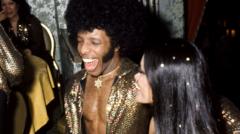This article explores the winning formula for the Eurovision Song Contest by examining the music, lyrics, and stage presence of winning artists from 2000 onward, emphasizing themes of personal liberation and self-empowerment.
Unlocking the Secrets to Eurovision Success in a Few Steps

Unlocking the Secrets to Eurovision Success in a Few Steps
A guide to winning at Eurovision, delving into the themes and performances that have historically resonated with audiences.
What makes a song win at the Eurovision Song Contest, the largest cultural spectacle globally? Is it an upbeat disco tune that recounts a historical conflict, like Abba's "Waterloo"? Or perhaps a bold French ballad reminiscent of Celine Dion's triumphant 1988 performance? By analyzing each winning act since 2000, we can uncover the essential ingredients to create the ideal Eurovision entry.
**Step 1: Embrace Personal Liberation**
A common thread among successful Eurovision songs is the theme of personal empowerment. For instance, Conchita Wurst, the Austrian representative in 2014, delivered her powerful anthem “Rise Like a Phoenix,” which resonated deeply with themes of resilience and self-acceptance. The lyrics emphasized self-belief and overcoming struggles, both of which are fundamental motifs that connect with diverse audiences.
Moreover, engaging with the audience on a personal level can significantly elevate a song’s appeal, transforming a simple performance into a communal experience that celebrates individuality and freedom.
**Step 2: The Power of Spectacle**
While the sound is vital, Eurovision is a visual feast, too. The performance itself can leave a lasting impression that propels a song to victory. Elaborate stage setups, striking costumes, and choreographed dance numbers can enhance a song's message and contribute to its memorability. Audiences latch onto the uniqueness of each performance, creating a sense of anticipation and excitement.
**Step 3: Avoid Key Changes**
Interestingly, experts have noted that avoiding unexpected key changes may contribute to a song's success on this grand stage. A consistent musical structure allows the audience to engage fully with the song without distraction, making it easier for them to remember and root for the performance.
**Step 4: Ingenuity and Quirkiness**
Eurovision thrives on creativity, so being artistically daring can set a song apart. Unconventional song structures and quirky staging are often celebrated, allowing each act to showcase their individuality while capturing the essence of what Eurovision stands for—innovation and cultural exchange.
**Step 5: Connection with the Audience**
Winning acts tend to forge a connection with the audience, often through relatable lyrics or energetic performances that evoke emotions. Engaging the crowd, whether through call-and-response interactions or by making people feel empowered to partake in the song's message, plays a crucial role in securing points from both the public and jury votes.
In conclusion, winning Eurovison is about more than just a catchy tune; it’s a complex recipe that blends powerful lyrics, inspiring messages, visual spectacle, and audience engagement. Embracing these core strategies could help aspiring artists rise like a phoenix in this iconic international competition.





















